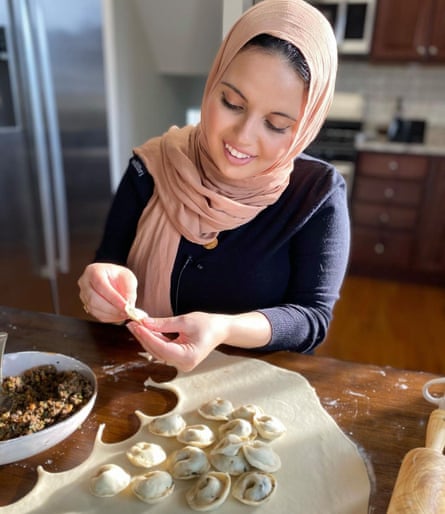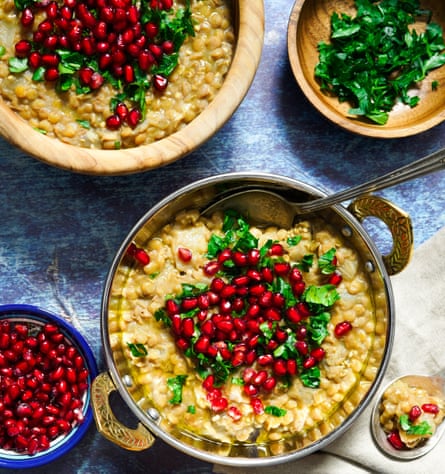When Heifa Odeh first moved to Chicago, she felt homesick for her mom’s Palestinian cooking and a desire to master the dishes she grew up with – so she started writing down her mom’s recipes and sharing them online. Whether she was whipping up stuffed grape leaves or hand-shaping shish barak (meat dumplings cooked in yogurt), she simply wanted to evoke the tastes of her mother’s kitchen and the frequent summer trips her family would take to Palestine.
But as the years passed and she built a successful food blog called Fufu’s Kitchen and later published a cookbook called Dine in Palestine, she started to see sharing Palestinian recipes as something more: an assertion of identity and connection to a land and people under threat. That’s never felt more crucial to her than in the last two months, as more than 20,000 Palestinians have been killed in Gaza by Israeli forces to date, following a Hamas attack that killed 1,200 Israelis.
“I started my blog as a means of preserving my Palestinian identity,” Odeh shared in an Instagram post on 30 October. “I know I’m ‘just’ a Palestinian Food Blogger but I choose to share the food of my people as a form of resistance.”
As much as she would love to stick to just sharing recipes for pistachio cardamom ghraybeh shortbread cookies, not speaking out about the violence and displacement facing Palestinians hasn’t felt like an option for her. Not least because the result of the blockade and bombing has increasingly left Palestinians without access to the water and food – a stark contrast to Odeh’s own kitchen, and one that pains her to think about. “I wouldn’t say I’m a political person, but you have to stick up for what’s right,” she later said on the phone.
She’s not alone: Odeh is just one of a number of chefs and food influencers who have been using cuisine as a medium through which to tell more humanizing stories about Palestinians.

Wafa Shami, who grew up in Ramallah, a Palestinian city in the West Bank, and moved to California as an adult, is another. The food photographer and recipe developer behind Palestine in a Dish, Shami noted that simply saying she’s from Palestine is considered a political statement, whether she intends it to be or not. While she acknowledges the value of activism and lobbying, she’s chosen to engage instead by sharing images of musakhan rolls (chicken and caramelized onion rolls) and rummaniyeh (lentil and eggplant stew).
“I just want to show off the beauty of Palestine, the humanity, the culture, away from the politics,” she said. “Images in the mainstream media here basically show Palestinians as evil, angry, throwing stones or burning tires. But Palestinians are so much more – our art, our music, our food.”
Staples become luxuries
Perhaps no one has more clearly articulated the connection between Palestinian foodways and political realities than Laila El-Haddad, journalist and co-author of the 2013 cookbook The Gaza Kitchen. Growing up between Kuwait and Saudi Arabia, El-Haddad spent summers in Gaza before moving to the US to attend Duke and Harvard. She returned to Gaza as a reporter for Al Jazeera before moving to Maryland, where she now lives.
“The more I wrote about guns and hard news, the more jaded I became. If my objective was to convey the everyday struggles of Palestinians to a wider audience, especially a western audience, I felt like I was failing,” she said. “So I felt like maybe [writing about food] is something that can be more effective in telling the story in a different way.”
Take, for example, the remarkable diversity of Gaza’s cuisine despite its small size. Gaza City’s food is known for its spiciness and use of peppers, while villages in the farming interior of the Gaza Strip eat much milder food. Those differences, El-Haddad said, stem from Gaza’s population being made up of Palestinians from all over the land who ended up in Gaza after the 1948 nakba and have never been able to return to their villages. They all brought their regional cuisines with them, turning Gaza into a hub of culinary diversity.
Shrimp stews baked in traditional clay pots have been a Palestinian favorite in the past. But in recent years, seafood has increasingly become a luxury in Gaza, despite it being a coastal territory. It’s hard for citizens to get ahold of seafood because Israel prohibits Palestinian fishermen from venturing more than 15 nautical miles from the shore, which limits their catches and because the “deliberate impoverishment” of the population has made fish and other animal proteins increasingly unaffordable, El-Haddad said. The World Food Programme said that “100% [of the population of Gaza] are food insecure at this moment” compared with 33% before 7 October, a predicament that has been “exacerbated by tightened blockades” and the bombing of at least a fifth of the bakeries in Gaza.
If any one ingredient symbolizes Palestine, it is olive oil. Shami has fond memories of harvesting olives as a kid and has even written a children’s book about the experience. “The harvest is a celebratory occasion for Palestinians – they’re singing and dancing, celebrating the blessing from the trees every year,” she said. “If you drive through different villages and towns in Palestine, you would see a ton of olive orchards, which can live for over a thousand years.”

But that symbol of Palestinian connection to the land has been slowly chipped away, according to El-Haddad. Israeli forces have targeted agricultural infrastructure, from land itself to irrigation systems to farmers’ homes. Farmers have been harassed for or blocked from caring for their land and harvesting from their olive groves, leaving olives to rot on the trees. In one recent case, IDF soldiers detained an olive farmer in the West Bank, who was in the middle of speaking to reporters, preventing him from reaching his land; in another, an olive farmer who was harvesting with his family was killed by an off-duty IDF soldier.
The resulting drop in production hurts on a dietary and symbolic level for a people who rely heavily on olive oil in their cuisine and identify deeply with olive trees. Even before the current bombardment, El-Haddad said, olive oil had begun to shift from a staple to a luxury item in Gaza.
Sometimes the pain hits especially close to home: the Gaza Kitchen, which is now in its third edition, has outlived some of its contributors. El-Haddad’s aunt Anaam Daloul, whose recipe for pickled eggplant is featured in the cookbook, was killed three weeks ago in an Israeli airstrike.
The joy of eating
Just as Palestinians are targets of violence, so too are Palestinian foodways. Yet food remains a source of joy and passion for many Palestinians in Gaza, the West Bank and the wider diaspora.
Motaz Azaiza, a young Palestinian freelance journalist who has emerged as one of the leading documentarians of the war on the ground in Gaza, has posted some of the starkest and most haunting images of the aftermath of the bombings. He also recently posted a video on Instagram of friends cheering as one man flipped over makloubeh, a dish in which vegetables and sometimes meat are cooked at the bottom of a pot of spiced rice, with a caption that said “our Maklouba is our resilience”. The video, which has been viewed 62.7m times, is just one small example of the ways that food can spark joy in even the darkest circumstances.

El-Haddad saw another example of the connective power of food recently, in a large group chat for Palestinian Americans from Gaza. One time when the group was becoming a little too “rowdy” in a political debate, she simply asked, “What’s everyone cooking for dinner?” to de-escalate the conversation. Participants spent the next hour excitedly sharing about their favorite foods from back home, she noted with a chuckle.
For Shami, sharing gorgeous food imagery from her kitchen in California has felt wrong in a time when she knows so many in Gaza are “facing the immediate possibility of starvation”. But she’s been “overwhelmed in a positive way” by how many people from around the world are writing to her, tagging her in pictures and letting her know they’re cooking her dishes right now. Odeh likewise described being “moved to happy tears” by people – many of whom are neither Palestinian nor Arab – letting her know that they’re using her recipes to cook Palestinian food for the first time ever. That solidarity through food has meant the world to both women.
“When you share a meal with somebody, you are connected at a deeper level,” Shami said. “We have a saying back home that goes something like, ‘I’m connected to that person because we broke bread together.’ Food connects people. That’s how we tell these stories.”
free primogems generator genshin impact hack 2022
ZEPETO Zems Hack: A Complete Overview
funzpoints casino app download for iphone better still you don t
Free TikTok Coins Today: Quick Tips
Brawl Stars Gems Hack Safety: Best Practices
unlimited cheat free dragon city gems generator
hack family island cheats gift codes resources speedup rubies
generator hay day coins and diamonds hack free genshinlife
tutorial how i get unlimited diamonds in litmatch app youtube
myths of moonrise codes get your freebies
cryptocurrency full course simplilearn youtube
evony the king s return mod apk hack unlimited gems
dice dreams hack 2023 amazing free coins and free rolls
how i got free gems coins using this project makeover mod
beach buggy racing mod apk 2023 01 11 free purchase
TikTok Coin Generators: Fact or Fiction?
Recommandations d’experts : Le hack des pièces TikTok
A Deep Dive into Free Coins Generation in LivU Video Chat
Boost Your Coin Master Progress with Free Spins
Avakin Life Avacoins Farming: Your Ultimate Guide
A Deep Dive into Credits Generation in Bingo Blitz
Free TikTok Coins: The Game Changer
Der Einstieg in TikTok-Münzen: Ein Leitfaden für Anfänger
How to Legally and Quickly Get Free Coins in LivU Video Chat





